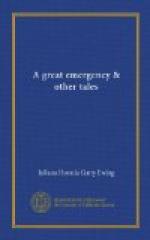The interview was now at an end, but as Mr. Rowe stepped briskly on board, the fur cap nodded to the forehatch, where Fred and I were sitting on coiled ropes, and the fancier said very knowingly, “The better the breed the gamier the beast.”
He patted the bull-dog as he said it, and the bull-dog kissed his dirty hand.
“Hup to hanythink,” were Mr. Rowe’s parting words, as he went aft, and the driver called to his horse.
He may have referred to the bull-dog, but I had some doubts about it, even then.
CHAPTER X.
LOCKS—WE THINK OF GOING ON THE TRAMP—PYEBRIDGE—WE SET SAIL.
During our first day’s voyage we passed two locks. There was one not very far from home, and Fred and I had more than once been to see a barge pass it, sitting on the bank whilst the boat gradually sank to the level of the water below.
It was great fun being on board whilst the barge went down and down, though I must say we did not feel anything peculiar, we sank so gradually.
“Just fancy if it was a hole in the ship’s bottom,” said Fred, “and we were settling down with all on board. Some ships do, and are never heard of again.”
We amused ourselves as we went along by guessing beforehand on which shore the next house or hamlet would appear. We betted shillings on the result, but neither of us won or lost, for however often the shillings changed hands, they remained in the canvas bag.
Perhaps places look more as if events happened in them if you do not if now them well. I noticed that even our town looked more interesting from the water than I had ever seen it look, so I dare say to strangers it does not appear so dull as it is. All the villages on the canal banks looked interesting. We passed one soon after tea, where the horse rested under some old willows by the towing-path, and we and Mr. Rowe went ashore. Whilst the barge-master delivered a parcel to a friend, Fred and I strolled into a lane which led us past cottages with very gay gardens to the church. The church was not at all like S. Philip or S. James. It was squat, and ivy-covered, and carefully restored; and it stood in a garden where the flowers almost hid the graves. Just outside the lych-gate, four lanes met, and all of them were so shady and inviting, and it was so impossible to say what they might not lead to, that I said to Fred,
“You said the only way to run away besides going to sea was to tramp. It sounds rather low, but we needn’t beg, and I think walking would be nice for a change, and I don’t believe it would be much slower than the barge, and it would be so much shadier. And we could get off from Old Rowe at once, and hide if we heard anybody coming. I wonder how far it is to London now?”
“Not far, I dare say,” said Fred, who was pleased by the idea; “and if we keep on we must get there in time. And we can get things to eat in the hedges, which we can’t do on the barge.”




